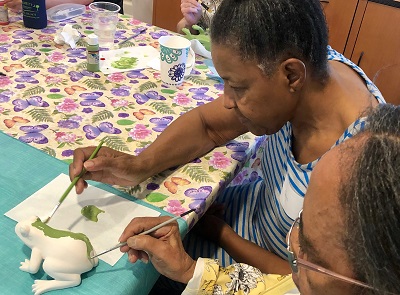Tips for Managing Stress

What you may feel as a family caregiver:
Anxiety and Worry
You may worry about how you will handle the additional responsibilities of caregiving and what will happen to your family member if something happens to you. You may also fear what will happen in the future as your loved one's illness progresses.
Anger or Resentment
You may feel angry or resentful toward the person you're caring for, even though you know it's irrational. Or you might be angry at the world in general, or resentful of other friends or family members who don't have your responsibilities.
Guilt
You may feel guilty for not doing more, being a "better" caregiver, having more patience, or in the case of long distance caregiving, not being available more often.
Grief
There are many losses that can come with caregiving. The healthy future you envisioned with your spouse or child, the goals and dreams you've had to set aside.

Even if the person you’re caring for can no longer communicate verbally, it’s important to take a short time to focus fully on him or her. Avoid all distractions – such as the TV, cell phone, and computer – make eye contact (if possible), hold the person’s hand or stroke his or her cheek, and talk in a calm, reassuring tone of voice. When you connect in this way, you’ll experience a process that lowers stress and supports physical and emotional well-being for both of you.
Of course, if you’re distracted, burned out, or otherwise overwhelmed by the daily grind of caregiving, you’ll likely find such a connection difficult. That’s why it’s vital that while you’re caring for your loved one, you don’t forget about your own needs. Caregivers need care, too!
Here are ways to help you keep stress in check.
1. Simplify your lifestyle so that your time and energy are available for things that are really important.
2. Structure your day. Develop routines and predictable schedules to make life easier for you and for your loved one.
3. Worry only takes your energy. Take one day at a time. Try not to worry about what might happen in the future. Planning for the future is important, just not the worry part.
4. Have a back-up plan such as pre-arranged respite care, or a friend or relative to call on when you have an emergency or illness strikes.
5. Keep your sense of humor and have fun. Laughter helps to put things in a more positive perspective. Plan for outings and things that you both like to do.
6. Remember that your loved one is not being “difficult” on purpose. It is the disease that distorts his/her behavior and affects his/her emotions.
7. Try to see their 'world' as if you were in their shoes. Remember that your loved one is so much more than the disease.
8. Focus on and enjoy what your loved one can still do. Do not lament over what they can’t do anymore.
9. Try to remember their love for you when they can no longer remember.
10. Take a deep breath! Remind yourself that you are doing the best you can at this moment.
11. Understand your own physical and emotional limitations. Give yourself frequent breaks from caregiving. Even an hour a day is a big help!
12. Get regular physical exams. Do not let your health deteriorate.
13. Join a support program and learn all you can about the disease.
14. Draw upon whatever Higher Power you believe in to sustain you in the good times and the trying times.

Above: Carolyn English, LSW, shares strategies to better deal with stress and ways to improve our resilience.